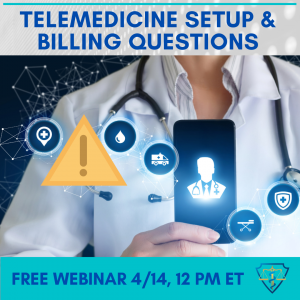Florida Advanced Practice Registered Nurses can now own and operate autonomously in primary care without a supervising physician. Learn more on how to get started.
Continue readingGetting Back to a New Workplace Normal
 By: Steven Boyne
By: Steven Boyne
As employers begin to consider opening their offices and bringing back their employees and inviting other people into their offices, such as patients, there are many issues that should be considered and planned for BEFORE the front door is opened.
Quick Legal Advice – COVID-19 is new to everyone, including Government regulators and plaintiff lawyers, so we are all learning as we go along. The best legal advice in these uncertain times is:
- Find out what other similar situated companies are doing, as you may be held to their standards;
- Find checklists and advice from well reputable entities;
- Document your decisions; and
- Communicate.
OPENING YOUR DOOR TO YOUR EMPLOYEES
As an employer you have a responsibility to provide a safe working environment, and as of today it is clear that the following is a minimal list of considerations:Continue reading
Governor DeSantis Issues Executive Order 20-114 Extending State of Emergency
 By: Susan St. John
By: Susan St. John
Earlier today, Governor DeSantis issued Executive Order 20-144 extending the State of Emergency declare in Executive Order 20-52 for another 60 days. Pursuant to the extension of Executive Order 20-52, the State Surgeon General’s Order 20-003 is also extended another 60 days as its expiration is tied to the expiration of Executive Order 20-52. Thus, telehealth providers from other states with valid and unencumbered licenses may continue to provide telehealth services to persons in Florida without registering with the Department of Health. Telehealth services must still be provided using two-way audio and video communications. Audio-only telephone calls are not permitted under Florida’s existing telehealth statute and have not been waived or suspended via the State Surgeon General’s Orders.Continue reading
A Few Nuances to the Paycheck Protection Program Established Pursuant to the CARES Act
 By: Susan St. John
By: Susan St. John
The Paycheck Protection Program under the CARES Act (the “Act”) allows a small business to apply for a low interest rate loan to sustain the business during the economic disruption caused by COVID-19. This program focuses on payroll costs as opposed to revenues of the small business. Allowable uses of the PPP loan funds include the following:
- Payroll costs;
- costs related to the continuation of group health care benefits during periods of paid sick, medical, or family leave, and insurance premiums;
- employee salaries, commissions, or similar compensating;
- payments of interest on any mortgage obligation (which shall not include any prepayment of or payment of principal on a mortgage obligation);
- rent (including rent under a lease agreement);
- utilities; and
- interest on any other debt obligations that were incurred before the covered period.
The Act defines payroll costs as follows:
- the sum of payments of any compensation with respect to employees that is a:
- salary, wage, commission, or similar compensation;
- payment of cash tip or equivalent;
- payment for vacation, parental, family, medical, or sick leave;
- allowance for dismissal or separation;
- payment required for the provision of group health care benefits, including insurance benefits;
- payment of any retirement benefit; or
- payment of State or local tax assessed on the compensation or employees; and
- the sum of payments of any compensation to or income of a sole proprietor or independent contractor that is a wage, commission, income, net earnings from self-employment, or similar compensation and that is in an amount that is not more than $100,000 in 1 year, as prorated for the covered period; and shall not include the compensation of an individual employee in excess of an annual salary of $100,000, as prorated for the covered period; taxes imposed or withheld under chapters 21, 22, or 24 of the Internal Revenue Code for the covered period; compensation for employees outside of the US; qualified sick leave wages for which credit is allowed under the Families First Coronavirus Response Act; or qualified family leave wages for which credit is allowed under the Families First Coronavirus Response Act.
Webinar | Emergency Telemedicine Education: From Setup to Billing and COVID-19
 Just the other day CMS issued new rules and temporary waivers to help combat the COVID pandemic. We are getting flooded with questions about telemedicine in particular and wanted to highlight some of the points of the March 31st update that relate to telehealth.
Just the other day CMS issued new rules and temporary waivers to help combat the COVID pandemic. We are getting flooded with questions about telemedicine in particular and wanted to highlight some of the points of the March 31st update that relate to telehealth.
- Hospitals may use and bill for telehealth services so that patients can be screened without presenting at a hospital. The telehealth screening will allow hospitals to determine the most appropriate site for care, thereby minimizing the patient’s risk of exposure to COVID-19.
- Health care providers using telehealth will be able to bill for telehealth services at the same rate as in-person services of the same kind and level. Allowable telehealth services have also been expanded during the health care crisis.
- Importantly, a patient’s home may now serve as the originating site for Medicare telehealth services. CMS is also allowing for required supervision of lower level clinicians to be accomplished through virtual technology if appropriate for a patient’s particular situation.
- Further, providers, including practitioners, may be able to temporarily enroll in Medicare to be able to assist with the current health care crisis.
Even though CMS has created some flexibility during this incredibly uncertain time…something about telemedicine laws remaining tricky and not being a one size fits all suit. Attorney Susan St. John will give you all of the details on how telemedicine set up, billing questions and more! Join us for this free webinar.
April 14 @ 12:00 pm – 1:00 pm
Free
- Download the webinar here.
- Past webinars – free downloads
Noncompete Agreement Tips and Mistakes to Avoid After COVID-19
 By: Jeff Cohen
By: Jeff Cohen
COVID is proving to be so burdensome on employers that we are seeing lay-offs and furloughs all over the country. As the virus curve bends back in a positive direction and physician and patient concerns for safety wane, patients will stream back to office. But what happens to the laid off (or furloughed) employees and contractors with non-competes? Will they come back or will they have moved on, possibly in a way that violates their noncompetes? And will a court think a noncompete has been violated when an employee or contractor was let go and there is no specific provision in their written contract that allows the employer to immediately let someone go without notice due to this type of situation? How will the COVID based lay-offs and furlough affect noncompetes? The short answer is we don’t yet know, but widespread lay-offs and furloughs may result in a flood of cases being filed because (1) many have been let go, (2) there likely isn’t a provision in their contract with the employer that specifically authorizes that sort of termination, and (3) a contract’s “breach” (e.g. no contract based allowance for the prompt termination) is traditionally a defense to an action to enforce a noncompete.
The COVID Issue
Though there is an exception for unusual specialties or where there is essentially a community need, noncompetition covenants are generally enforceable in Florida with respect to doctors and other healthcare professionals. Many people think doctors in particular can’t be restricted from practicing medicine under any circumstances. That is just not true.
Getting to the bone of the issue, noncompetes are enforceable in Florida if:Continue reading





